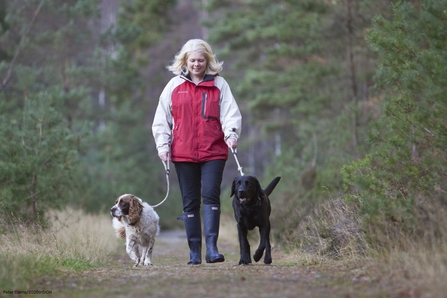
Responsible dog walker with dogs on leads. Image by Peter Cairns/2020Vision.

Responsible dog walker with dogs on leads. Image by Peter Cairns/2020Vision.
Experts say dogs off leads are one of the biggest causes of wildlife disturbance – this is particularly problematic when many species are breeding and vulnerable either on or near the ground.
Ground-nesting birds such as curlew, corn bunting and skylark, are particularly at risk. Research shows that 66% of ground-nesting birds are in decline in the UK, compared to 31% of other species.
Dogs can also be a threat to sheep, cows and other grazing livestock, with regular problems reported on land owned by Northumberland Wildlife Trust.
The majority of the Trust’s reserves welcome responsible dog walkers but instances of loose dogs disturbing wildlife and livestock have led the charity to issue a plea ahead of spring.
At its Weetslade reserve, volunteers constructed four large skylark breeding enclosure to allow a safe place for the birds to breed without any disturbance from humans or dogs.
Elsewhere, there have also been instances of dog walkers flattening and cutting down wire fences to access other parts reserves with their dogs which has resulted in sheep and ponies escaping onto other areas of the reserve or, in one case, onto the road.
Each year, at least one of the Trust’s Flexigraze sheep die following dog attacks at a number of its reserves around the Region. Manx loaghtan sheep, grazing on its Holywell Pond reserve in North Tyneside have been killed, and most recently, two Shetland ponies and two Swaledale sheep were injured or killed on a number of Druridge Bay reserves.
Dog waste is dangerous for wildlife too, as it can carry diseases, scare away animals and fertilise soils, affecting the natural balance of fragile habitats.
Dog owners can help wildlife if they:
Duncan Hutt, Northumberland Wildlife Trust Director of Conservation says:
“It’s great that so many people benefit from enjoying beautiful natural areas while out walking their dogs, but we urge responsibility and ask that they are kept under control and on a lead.
“Wildlife is suffering huge declines and dogs in wild places can cause problems, especially from February through to the end of summer when many species are breeding.
“I’m a dog owner but never walk him without a lead during nesting season. It’s not only the impact on ground-nesting birds, but other wildlife including amphibians and mammals can be affected, as well as grazing livestock.
“We urge others urging to be vigilant for any out-of-control dogs to prevent unnecessary suffering to sheep and resident wildlife, and to report suspicious activity to the Police via 111. It is worth remembering that if a dog is seen worrying livestock, the landowner can legally destroy the animal.”
Jenna Kiddie, head of canine behaviour at Dogs Trust, says:
“A countryside dog walk is understandably popular, especially as we move into the warmer months. But owners have a responsibility to keep their dog under control, including around livestock and wildlife, to ensure they do not worry other animals or stray onto neighbouring land for everyone’s safety and wellbeing.
“This can be managed by ensuring dogs are kept on a short lead, and close to their owners, whenever livestock are nearby, within seeing, hearing or smelling distance or whenever their presence is likely to be expected. It is important to remember that chasing is normal dog behaviour, and that any dog is capable of chasing, irrelevant of breed, type, age or size.”
The law states you must keep your dog on a lead no longer than two metres between 1st March and 31st July when on any open access land to protect ground-nesting birds.